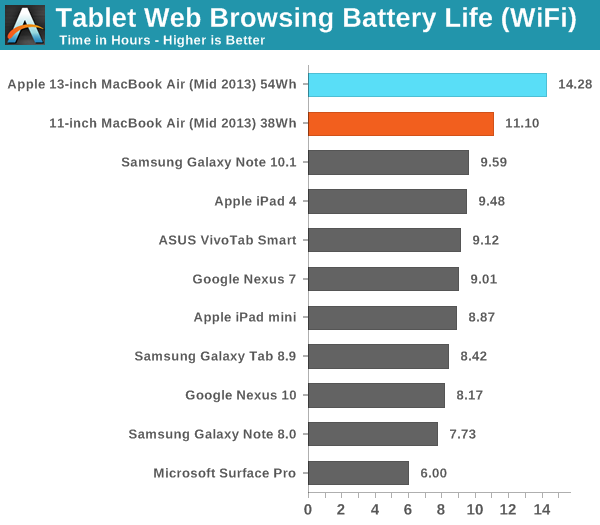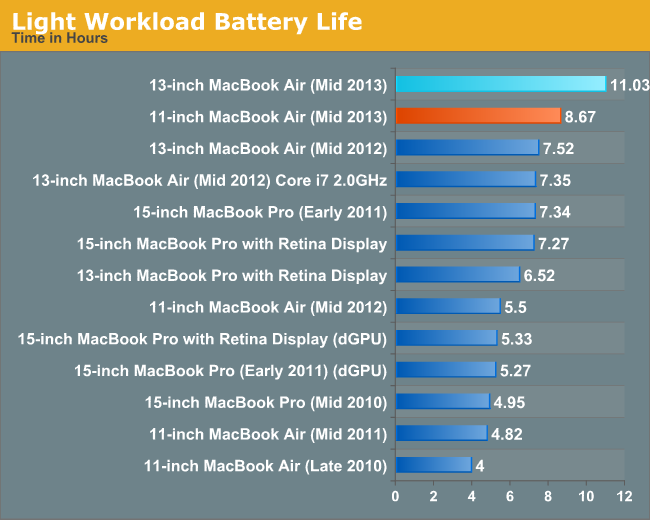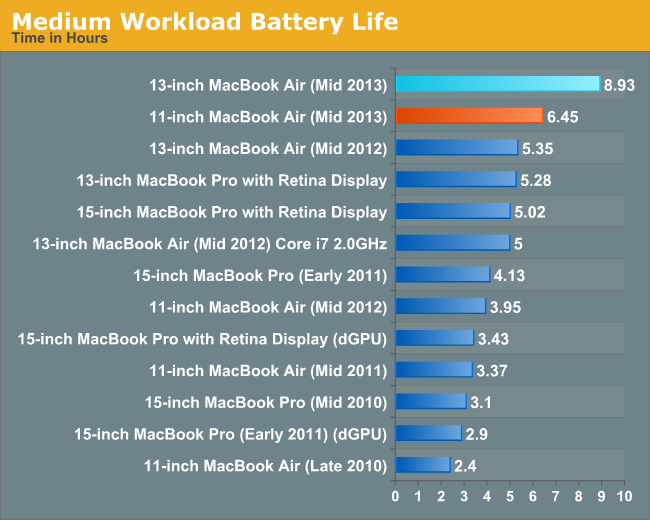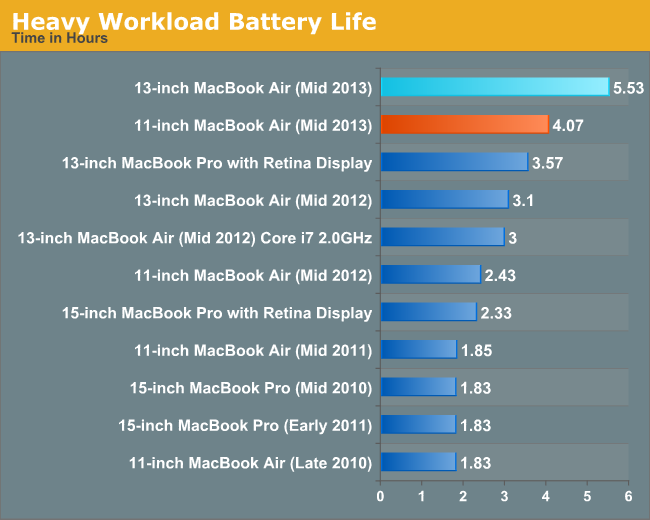The 2013 MacBook Air Review (11-inch)
by Vivek Gowri on August 9, 2013 1:45 AM ESTHonestly, for me, this is by far the most important part of the review. With there being not much in the way of performance upgrades or new features compared to previous generation Airs, the battery life improvement is basically at the heart of what makes the new Air attractive. Obviously, this isn’t exclusive to just Apple—any Haswell ULT Ultrabook with 40-50Wh of battery capacity should get you 8-10 hours of battery life.

But it’s honestly amazing to use a fully fledged notebook that can battle Atom and ARM for battery life. The image from Anand’s 13” Air review showing an estimated 16 hours of battery life was awesome, even if the OS X battery runtime estimate tends to be wildly optimistic in the early part of a battery cycle. The 11” isn’t quite that far, but it still has better battery life than my iPad. Granted, my 3rd-generation iPad now has a year of wear on the battery, but still—it’s longer lasting than my iPad was when new, and it’s also longer lasting than the 4th gen iPad. And not just by a little, it’s a pretty significant step up. That’s a really important corner to turn for the notebook market, double digit battery life without having to resort to an extended or secondary battery like some business notebooks have offered in the past.
As Anand covered in his recent Haswell ULT battery life article, Intel still needs to work on the power efficiency of the Haswell video decode engine, since ARM-based SoCs still hold a sizable advantage there. But other than that caveat, the overall power consumption of Haswell is an absolute game changer. I’ve never even thought to take the power cord with me anywhere in the month that I’ve had it. Want to take the Air for a weekend away and not plug it in once, iPad style? Depending on how much of your usage can get pushed to a smartphone, that’s a legitimate and realistic possibility.
The 11” Air, by virtue of its smaller display, is slightly more efficient than its larger sibling, but the 42% advantage in battery capacity pushes the 13” Air’s battery life into the insane range. Being able to rely on nearly 10 hours of battery life or more in most normal use cases is just ridiculous. The 11” is a bit less phenomenal, but anything that can claim better battery life than the iPad, even with a smaller battery, is doing just fine.



At 8.5 hours dead on in our usual Mac light browsing test, the 2013 11” is three hours ahead of the 2012. That’s 54.5%. It’s nuts, the end. That advantage holds basically through the rest of our more strenuous battery life tests. The previous 11” really had an issue with battery life—the real-world 5 hours of runtime just didn’t cut it given the sacrifices made for mobility; it made much more sense to get a 13”. Now, with 8+ hours of runtime, it’s easier to ignore. The jump from 5.5 to 7.5 hours of battery life makes a pretty significant difference in how the system gets used, but I’m less sure about the difference between 8.5 and 11. Once you’re already in that 8-10 hour battery life range, adding two or three hours on top of that is a lot less valuable than it would be in a situation where you’re adding that amount to get to that range. This isn’t to say that more battery life isn’t always better, just that at some point it becomes something that is nice to have rather than something that changes the essence of the system, almost like the difference between an i5 and an i7 CPU.










139 Comments
View All Comments
Torrijos - Friday, August 9, 2013 - link
One has to wonder how much more battery life improvements OS X Mavericks will bring, seeing how Apple made most of their selling points about energy efficiency.xTRICKYxx - Friday, August 9, 2013 - link
I've been using Mavericks for a while and I haven't noticed anything too drastic. I typically get around 7-8 hours of light workload for my 15". At most maybe a 10% increase.But this is not including the fact that most of my 3rd party apps do not include App Nap yet. It could make a difference.
ctrocks - Friday, August 9, 2013 - link
I still want to know the fascination with 11 inch notebooks. I am 6'3" (1.9m) tall, with relatively large hands, and am 47 with good vision for my age (no glasses needed yet). 13 inch notebooks seem small to me, let alone 11. My hands can't fit comfortably on keyboard to touch type.I understand portability, but I just can't see using such a small device except for cases where extreme portability is an absolute necessity. I would prefer a 15 inch screen, and a bigger keyboard that fits me over portability.
abazigal - Friday, August 9, 2013 - link
You just answered your own question. Ultra-portability. 15-inch laptops are great to use, but absolute murder to haul around when it's time to pack up and leave.ananduser - Friday, August 9, 2013 - link
Since you talked about the new Sony Vaio, how about, you know, actually reviewing one(the Pros or the Duo or both). You(Anandtech not Vivek) have reviewed 3 MBAs already and not a single other ultraportable.BTW corners have been cut in order to achieve the MBA's battery life, the low res screen and the relatively slower CPU. Why not mention it so as to compare apples to apples(no pun intended)?
fokka - Friday, August 9, 2013 - link
though i'm not a big fan of the mba, i still think that it is a valid choice for someone seeking portability and not dependent on a ton of processing performance, even more now the battery life has improved to a level you don't really have to think about it much anymore on a day to day basis.sure, the display is a bit of a bummer, but only because we became so spoiled by tablets and high-DPI laptops in the recent years. still, it won't hinder you doing any of your work.
what i like about the air and essentially the entire macbook line-up, is that they are no-nonsense solutions. you get a great package of high quality case, great input devices, above average display quality and most important usable battery life on a mobile device.
just compare it with the vaio pro. i love some of the vaio lineup for their performance, features and portability, but no way in hell i'm going to shell out this much for a plasticy-feeling computer, no matter if they call the material carbon fiber, magnesium, or whatever they come up with.
still, using a 2010 mbp13 right now, i'm not really thinking of investing in apple gear again very soon since i learned to prefer a more native windows environment. this is where asus zenbook line comes into play and i hope they can make similar progress with the haswell upgrade as apple, all while providing a great 1080p display.
ESC2000 - Saturday, August 10, 2013 - link
So a plastic feel would stop you from an otherwise superior product? Thus is the same tired old argument always trotted out by Apple fans. They used it when the S4 came out with features that demolished the iphone 5. They've probably used it for every Samsung phone that has been released with that prole plastic.It is your business how you spend your money, but I but devices to perform tasks for me. If a physical feature is relevant to function (eg the air's unnecessarily large bezels take up precious screen real estate) then I care. But if the best device for me comes in plastic I don't care unless plastic will disrupt its functioning. I don't care whether other people think my device looks expensive. I don't care whether it feels 'plasticky' when I touch it. What is so terrible about plastic anyway?
I know this is a tired old argument. I should probably save this post in keep so I can just copy paste it every time someone tries to say metal is more premium. Apple did do a good marketing job on that one though.
fokka - Saturday, August 10, 2013 - link
i wouldn't even go so far as to call myself an apple fan, since the macbook is the only apple product i ever owned and i'm not having plans on upping that count in the future, but still, i can appreciate certain aspects, like the build quality, of their line up.see, in the end it's just personal preference. i for one wouldn't be happy with a "superior" machine hardware wise, if it feel plasticy and flimsy. and please don't tell me a VAIO lid doesn't feel flimsy. i can't comment specifically on the VAIO pro, but about every sony ultraportable i ever touched had a crazy thin display lid which twisted by mere looking at it, so i feel safe extrapolating from that.
if you are happy with a polycarbonate build that's great and i don't even mean this sarcastically, but for me, i want a device i use for hours to feel great and sturdy and i find this is more the case with a good metal build.
geok1ng - Friday, August 9, 2013 - link
U$1000 for a 768p TN panel. I do agree with the review: lets wait for the Surface Pro with Haswelll parts. Or get a real high end ultraportable with a real high end display, for the same price apple is asking for this airthingieabazigal - Friday, August 9, 2013 - link
Higher screen res typically comes at the expense of poorer battery life. Apple simply made a judgement call to prioritize battery life over everything else. I don't see that as an inherently bad thing.